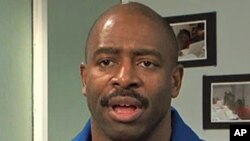February is Black History Month in the United States and Canada, a national observance that pays tribute to people and events that shaped the history of African-Americans and Canadians. It's also a time to educate people about the accomplishments of black people and their contributions to society. Last November, two African-American astronauts soared into space while reaching new heights in the U.S. Space program.
Shuttle launch countdown:
"Three, two, one and lift off of the Space Shuttle Atlantis."
Six astronauts rocketed toward orbit and the international space station. The mission had special meaning for Dr. Robert (Bobby) Satcher and Leland Melvin. They became the first African-American men to fly together on a shuttle mission.
Astronaut Bobby Satcher became the fourth African-American to space walk. He also made NASA history, becoming the first orthopedic surgeon in space, conducting a number of medical experiments. He says the future is bright for black astronauts.
"There is still a lot of firsts for us [black astronauts] to do and hopefully we will run out of those firsts pretty quickly because it is certainly my desire that one of the legacies that I would certainly like to leave behind is bringing in more African-American astronauts," said Dr. Satcher.
Mission specialist Leland Melvin controlled the robotic arm that helped Satcher and his crew during the space walks. Melvin has been an astronaut for 10 years. He says he's trying to be a role model to young African-Americans.
"So many kids got see two African-American men floating around in space," said Leland Melvin. "For a long time a lot of people were not given that opportunity. There were barriers. With dedication and perseverance anyone in this country can do anything they put their mind to and there are no limits."
In the early 1980s, Ronald McNair helped to lift the racial barrier at NASA's astronaut program. McNair and the crew of the space shuttle Challenger died when the orbiter exploded shortly after liftoff. Despite the dangers, and other people's doubts, Melvin says he was determined to be an astronaut.
"I had family members, I had people in my community, that told me, 'You can't be an astronaut'," he said. " 'You don't have this. You don't have that.' And I think we do a disservice to our kids when we tell them what they can't do instead of telling them what they can do."
"Why should you be an astronaut? I would say the main reason is if you want to go into outer space," he said.
Back from their recent mission, Satcher and Melvin are trying to encourage these black students to think about careers in the U.S. space program. Both astronauts stress the importance of education. Satcher has an extraordinary background, with advanced degrees in chemical engineering and medicine from some of the nation's top universities. He tells teenagers the key to being an astronaut is having a solid background in math and science.
"They are around the technology everyday, they just need to understand the technology," said Melvin. "How to make it, how to build it, and then they will become scientists and engineers."
Since 1983 there have been 20 black astronauts in the U.S. space program. Both Melvin and Satcher say they hope there will be many more African-American space explorers inspired by what they've accomplished, not only in outer space but on Earth.













